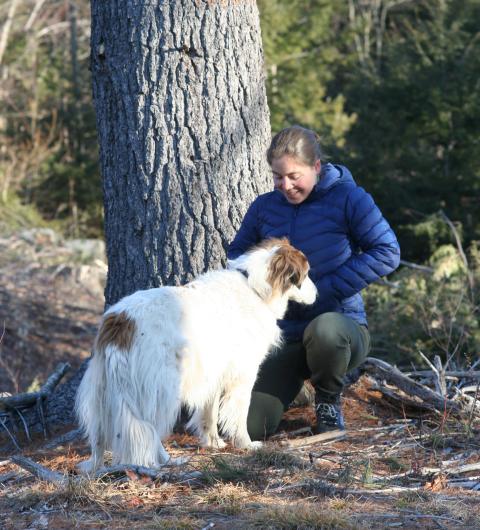
Katrina (Papanastassiou) Amaral earned both her bachelor’s degree in zoology and her master’s degree in natural resources: wildlife and conservation biology from UNH.
Katrina Amaral: I work in central New Hampshire as the executive director of Bear-Paw Regional Greenways, a land conservation nonprofit. I work with towns, landowners, and volunteers to conserve open space for people and wildlife. I also run a sawmill business, Timberdoodle Farm, with my husband (we met at UNH). We provide locally-sourced, sustainable lumber to woodworkers, builders, and farmers.
Katrina: My work at Bear-Paw permanently conserves open space within an 11-town region. This is really important because undeveloped land is vital for the local economy (farms and forest products), wildlife, and recreation like hiking or hunting. Natural landscapes are also extremely important for climate resiliency, buffering against extreme weather events, providing migratory corridors for wildlife, filtering water, and storing carbon.
2020 has also highlighted the importance of local recreation areas and the extra sense of calm that a tree-lined scenic road can provide. The Bear-Paw region has a lot of biodiversity and provides habitat for a large number of migratory birds, some of which are endangered.
"[C]onservation won't ever succeed without the human component."
The sawmill business converts what is usually a waste product (urban trees) to a useful lumber product. We are also keeping local timber local and reducing the carbon footprint of construction - a quality hardwood usually travels around the world twice between tree and final product, but everything we produce comes from New Hampshire trees.
Katrina: I apply a lot of what I learned at UNH, both as an undergrad and graduate student. Some things that prepared me most were my experiences with work study in a conservation genetics lab, participating in undergraduate research, and volunteering with UNH's Engineers Without Borders group. The conservation biology course I took with Professor Tom Lee was my first exposure to conservation nonprofits, but there's no real coursework or degree that prepares you for leading a land trust, so I rely on a lot of diverse experiences to help me do my job.
Katrina: I was interested in conservation because I love wildlife but conservation won't ever succeed without the human component. Join your Town's Conservation Commission, volunteer with a local nonprofit, submit public comments for federal environmental policy. Figure out how to connect with people, all kinds of people, in a way that makes them want to share your passion for a better world.